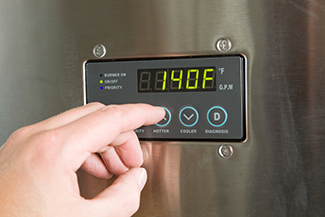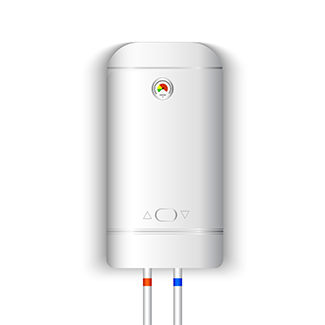What Homeowners Need to Know About Water Heaters
Water heaters 101
Water Heaters are a hard-working appliance in every home. Having enough hot water in your home is essential to keeping everything clean and sanitized. To make sure that your home has enough hot water when it is needed for a good hot shower, load of laundry, or washing dishes, take the time to learn which water heater is best in your situation.
We spoke with George Cathey, Service Manager at Rosie-Certified, Isley’s Home Service Service, to learn more about the types of water heaters, the pros and cons of each, and their care.
Gas and Electric Water Heaters
These are the most common water heaters. They consist of a big tank with heating elements, or a flame. The water is fed into the tank where it is kept warm until there is a demand for hot water.
The tank of a basic water heater comes in different sizes with the most common sizes being 40 and 50 gallons. There is generally a 6-year warranty on these tanks.
Challenges:
- Keeping water heated 24 hours a day can add a significant amount to the energy portion of your electric bill.
- When all of the hot water that is in the tank is drained it can take a while to reheat.
- Hot water can take a long time to feel hot at your faucet or shower.
Note: Recirculating pumps or timers can be installed to help alleviate these issues.
Heat Pump Water Heaters
Though these units are not as well-known as traditional units but Cathey prefers them. They work on the same principle as the heat pumps that heat your home. A combination of coils and refrigerant are used to heat the water as opposed to heating elements. Heat pump water heaters use less energy and hold a 10-year warranty.
Challenges:
- They cost about twice the amount of a traditional unit but, return on investment can be reached in 4 years.
- The technology requires a bigger housing for the water heater. Some are quite a bit taller than traditional element style units. Others actually come in 2 pieces also requiring more space. This could mean that you would need to expand the water heater closet in order to accommodate their size.
Tankless Water Heaters
 These are units that do not store water. Instead, the tankless heating unit hangs on the wall heating water as it passes through a heat exchanger. This process allows for endless hot water, shower after shower. The unit hangs on the wall in the same area as the traditional water heater. The warranty ranges from 10-15 years depending on the make and model. Tankless water heaters are available in both gas and electric but, most plumbers we know prefer the gas units. Ask your plumber for advice if your only choice is electric.
These are units that do not store water. Instead, the tankless heating unit hangs on the wall heating water as it passes through a heat exchanger. This process allows for endless hot water, shower after shower. The unit hangs on the wall in the same area as the traditional water heater. The warranty ranges from 10-15 years depending on the make and model. Tankless water heaters are available in both gas and electric but, most plumbers we know prefer the gas units. Ask your plumber for advice if your only choice is electric.
Challenges:
- If there are more than 2 users at a time on the unit it can have a difficult time keeping up demand.
- Cathey says the gas line that goes to your traditional water heater will sometimes need to be exchanged for a larger diameter one. Otherwise, installation is pretty basic.
General Maintenance
No matter what type of unit you have, maintaining your water heater is important. After all, water heaters never give out at a convenient time! Cathey observes that people who plan for replacement are more inclined to choose units that fit their home and lifestyle. Making a choice during an emergency usually ends with a decision that is less than optimal.
Suggestions for maintenance:
Install a water softener | It will extend the life of your water heater and keep it running more efficiently.
Note: a water softener is required for the warranty to be honored on a tankless unit for most manufacturers.
For tank heaters, traditional and heat pump units:
- Check the anode rod every 2 years. Water tanks will rust out over time but, the anode rod is made of softer metals of magnesium and zinc and will dissolve before the hard metal of the tank. Replacing this ‘sacrificial rod’ will continue to keep the tank from rusting.
- Elements need to be checked for continuity.
- Drain and flush annually.
- Add a drain pan and a leak detection sensor. These 2 items will go a long way to protect your home from water damage should the unit give out.
- Note: Many sensors have an app for smart phones allowing you to monitor the unit even while on vacation!
Professional Plumbing Inspection:
If you would prefer a professional to provide maintenance, consider Isley’s Home Service. Isley’s offers an annual service for $150 dollars that checks your whole house plumbing system. This includes:
- Basic water heater maintenance (draining and flushing, checking the anode rod for decay and the element for continuity)
- A whole house water pressure test
- Checking the health of the valves, toilets and faucets.
For $350 Isley’s offers a descaling service for tankless water heaters that dissolves calcium deposits!
Home Maintenance To-Do: #WaterHeater
Podcast
Sponsored By: Isley's Home Service
 Located in Gilbert, AZ and serving the Greater Phoenix area since 1957 is Isley's Home Service, Inc. They offer a variety of services including options for softening the water in your Arizona home, point-of-use reverse osmosis systems, and whole-house water filtration systems. Isley's Home Service also offers an annual maintenance plan as mentioned above for your existing reverse osmosis and water softeners. Never fear! Isley's is available 24/7 for emergency repairs.
Located in Gilbert, AZ and serving the Greater Phoenix area since 1957 is Isley's Home Service, Inc. They offer a variety of services including options for softening the water in your Arizona home, point-of-use reverse osmosis systems, and whole-house water filtration systems. Isley's Home Service also offers an annual maintenance plan as mentioned above for your existing reverse osmosis and water softeners. Never fear! Isley's is available 24/7 for emergency repairs.
###
Photo Credits:
- Shutterstock
- iStock
RELATED CONTENT:
- AZWQA: Water Softener Sustainability Professional | Arizona
- Arizona Water Quality Association: AZWQA.org
- Environmental Working Group’s What’s In Your Water Program
- Blog: Water Treatment Softening Myths
- Blog: Water Treatment From A One-Time Skeptic
- DIY Q&A: Rosie's Water Treatment Consumer Guide
- DIY Q&A: Would My Home Benefit from a Water Treatment System?
- DIY Q&A: Clean Water For Your Home
- Podcast: Plumbing Maintenance, Water Saving And Gas Fitting Appliances
